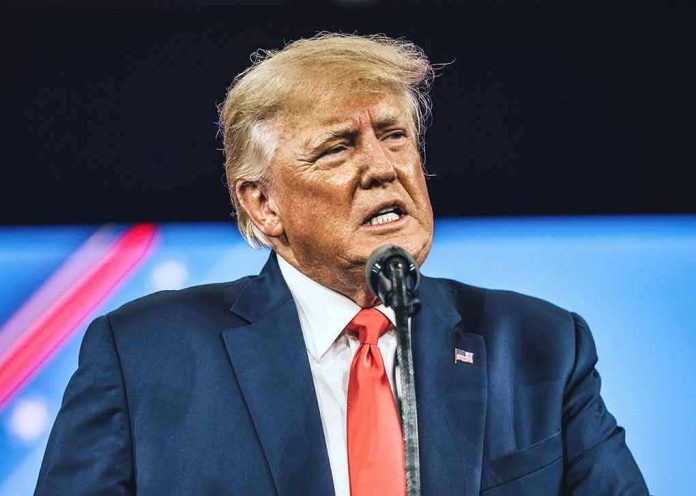
President Trump’s decisive cancellation of $4.9 billion in foreign aid funding exposes a power struggle in Washington and sparks fierce debate over America’s priorities and constitutional checks.
Story Snapshot
- President Trump used executive authority to cancel $4.9 billion in congressionally-approved foreign aid, igniting bipartisan opposition.
- The rarely-used “pocket rescission” maneuver bypassed Congressional approval and raised constitutional questions about separation of powers.
- Supporters see the move as a victory for fiscal responsibility and America First priorities, while critics warn of diplomatic and legal fallout.
- The legality of the executive action and its long-term impact on U.S. influence abroad remain under intense scrutiny.
Trump’s “Pocket Rescission”: An Unprecedented Use of Executive Power
President Donald Trump’s administration notified Congress of its intent to cancel $4.9 billion in foreign aid using a controversial tactic known as a “pocket rescission.” This mechanism, invoked by the Office of Management and Budget, allowed the executive branch to withhold funds until a congressional review period expired, effectively canceling previously approved aid without a direct vote from lawmakers. The maneuver targeted funds for international organizations, peacekeeping, democracy promotion, and development assistance, marking a significant assertion of executive power over spending decisions.
Historically, Congress controls federal spending, including foreign aid, while presidents can only propose rescissions that require legislative approval. The Trump administration’s use of the pocket rescission broke from tradition by attempting to override this process. This tactic had rarely been used, and its legality remains hotly debated. The move came amid broader budget negotiations and reflected the administration’s “America First” stance, prioritizing domestic needs and reducing international financial commitments.
Bipartisan Backlash and Congressional Concerns
The announcement triggered immediate bipartisan criticism on Capitol Hill. Lawmakers from both parties accused the administration of undermining the constitutional balance of power, with some calling the action “illegal.” Congressional leaders argued that the executive branch’s maneuver threatened to erode their authority over appropriations, a core component of the checks and balances system. Critics also raised alarms about the potential impact on U.S. credibility and leadership in global affairs, warning that abrupt funding cuts could destabilize international partnerships and diplomatic initiatives.
Despite bipartisan protest, the Trump administration defended the decision as necessary for aligning foreign aid with national priorities and curbing what it viewed as wasteful spending. The Office of Management and Budget maintained that the targeted programs did not reflect the administration’s foreign policy goals. This stance resonated with many Americans frustrated by years of unchecked spending and globalist policies that seemed disconnected from the interests of working families at home.
Impact on U.S. Influence, Policy, and the Constitution
The immediate consequences included disruptions to foreign aid programs, uncertainty for international partners, and potential diplomatic fallout. Long-term, analysts warned of damage to America’s standing as a reliable global partner and a possible weakening of its influence in international organizations. The move also set a precedent for future executive-legislative clashes over the federal purse, raising the stakes for constitutional governance. Many foreign policy experts and legal scholars argued that the pocket rescission tactic risked executive overreach, threatening the separation of powers established by the founders.
WATCH: Trump cuts nearly $5B of foreign aid#News #BreakingNews #USNewshttps://t.co/TiG516GGp4
— WonderfulWorldNews (@wworldrssnews) August 29, 2025
The Trump administration’s supporters, however, hailed the action as a long-overdue correction to decades of overspending and misplaced priorities. They argued that robust executive action was needed to rein in the bureaucracy and protect American sovereignty. The debate over the legality and wisdom of the maneuver continues, with Congress considering potential legal challenges and exploring ways to strengthen its control over federal spending. As the dust settles, this episode will likely influence how future battles over the federal budget and U.S. global engagement unfold.
Sources:
Lawmakers blast White House move to cancel $4.9B in foreign aid as ‘illegal’




